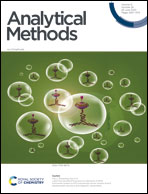Paper-based sorptive phases for microextraction and sensing
Abstract
The simplification of the analytical procedures, including cost-effective materials and detectors, is a current research trend. In this context, paper has been identified as a useful material thanks to its low price and high availability in different compositions (office, filter, chromatographic). Its porosity, flexibility, and planar geometry permit the design of flow-through devices compatible with most instrumental techniques. This article provides a general overview of the potential of paper, as substrate, on the simplification of analytical chemistry methodologies. The design of paper-based sorptive phases is considered in-depth, and the different functionalization strategies are described. Considering our experience in sample preparation, special attention has been paid to the use of these phases under the classical microextraction-analysis workflow, which usually includes a chromatographic separation of the analytes before their determination. However, the interest of these materials extends beyond this field as they can be easily implemented into spectroscopic and electrochemical sensors. Finally, the direct analysis of paper substrates in mass spectrometry, in the so-called paper-spray technique is also discussed. This review is more focused on presenting ideas rather than the description of specific applications to draw a general picture of the potential of these materials.



 Please wait while we load your content...
Please wait while we load your content...